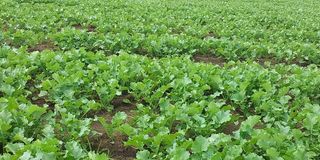Rongai farmer spills the beans on contract farming

A field of the Canola crop.
For Chris Kamiti, contract farming has been the meeting point between stability and opportunity in agriculture.
Three years ago, Kamiti began canola farming in Rongai. This, he says, has transformed his approach to agribusiness.
“The biggest benefit is the ready market,” he explains, noting that unlike traditional farming, he no longer worries about selling his harvest.
He adds that Contract farming also gives him access to leased seeds, training, and regular visits from experts who guide farmers on achieving better yields.
Kamiti grows canola and barley under contract, while also cultivating maize and potatoes independently. The difference, he says, is significant noting that crops without contracts often face unstable prices, leaving farmers uncertain about their returns.
In contrast, canola not only improves soil health but also requires fewer chemicals and lower input costs compared to other crops.
However, contract farming is not without its challenges. Kamiti points out that once signed, farmers must sell exclusively to their contracting company.
“Sometimes after harvesting the price is high in the market, but you can’t sell because you are under contract,” he says. Similarly, when market prices dip, contracted farmers remain bound to the agreed terms.
Currently, Kamiti has planted about 70 acres of barley and canola. While he plans to diversify into other crops, he sees contract farming as a reliable foundation.

Some of the Canola on Chris Kamiti's farm before it flowers. Photo taken on August 27,2025.
He encourages farmers to consider the model, especially for its long-term benefits. “People should accept contract farming because they will help you throughout the journey,” he says.
For young people interested in joining, Kamiti’s advice is "Approach the company of your choice, and the company will assess the farm before providing support. It is important to do due diligence first to avoid losing money".
To cushion himself against risks such as crop failure due to issues including pests and diseases, Kamiti also insures his crops.
He believes insurance is important because it gives him peace of mind, protects him from unexpected losses, and ensures they remains financially secure even during difficult seasons.


